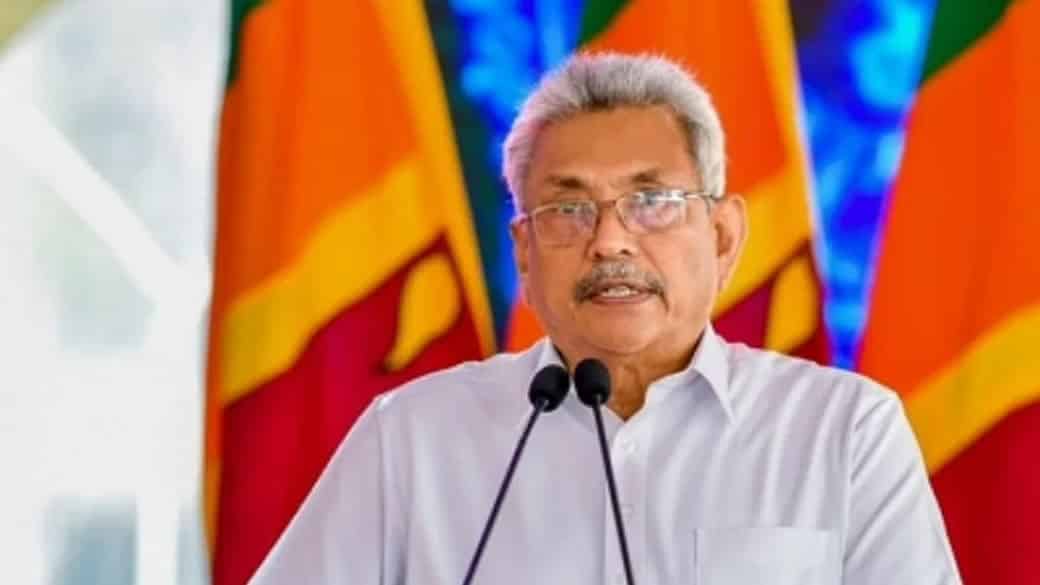
Gotabaya Rajapaksa has resigned as president of Sri Lanka and reportedly fled to Maldives in the midst of widespread protests in the country. Photo: National Herald.

Orinoco Tribune – News and opinion pieces about Venezuela and beyond
From Venezuela and made by Venezuelan Chavistas

Gotabaya Rajapaksa has resigned as president of Sri Lanka and reportedly fled to Maldives in the midst of widespread protests in the country. Photo: National Herald.
Sri Lanka’s Opposition parties resumed talks on Monday, July 11, to discuss the formation of an all-party interim government after the president and prime minister offered to resign as unprecedented protests broke out and thousands of enraged demonstrators stormed the leaders’ homes over their mishandling of the country’s worst economic crisis.
President Gotabaya Rajapaksa officially informed Prime Minister Ranil Wickremesinghe on Monday that he will resign as previously announced on Wednesday after protesters stormed his official residence, calling for him to step down over his handling of the country’s dire economic crisis. However, news has emerged since then that Rajapaksa has fled to Maldives.
Prime Minister Wickremesinghe has also resigned, saying that he is willing to make way for an all-party government to take over. Protesters breached his private residence and set it on fire, according to his office.
Dramatic images showed demonstrators inside the president’s building hanging banners from the balcony, as well as swimming in the pool of the building.
Opposition parties held talks on Sunday, July 10, and decided to continue the dialogue to form an all-party interim government after President Rajapaksa and Prime Minister Wickremesinghe agreed to resign.
A special meeting of the Committee on Parliamentary Affairs was held on Monday afternoon under the chairmanship of Speaker of the Parliament Mahinda Yapa Abeywardena to discuss the future political affairs of the country, reported Colombo Page.
The appointment of a new president after Rajapaksa leaves the presidency and the formation of a new government was discussed at the meeting.
The main opposition party of the country, Samagi Jana Balavegaya (SJB), announced on Monday that it wanted lead the next government to bring stability to the island nation.
“We’re ready to protect the motherland, to give leadership to the motherland, to build the economy,” said SJB leader Sajith Premadasa. “We will appoint a government headed by a president and a prime minister. There is no other alternative.”
This announcement created tensions in the all-party meeting held in the parliament on Monday.
According to the Sri Lankan Constitution, if both president and prime minister resign, the speaker of parliament will serve as acting president for a maximum of 30 days. Meanwhile, parliament will elect a new president within 30 days from one of its members, who will hold the office for the remaining two years of the current term.
As no agreement regarding an interim government was reached in Monday’s meeting, Speaker Abeywardena announced that a new president will be elected on July 20. In the Sri Lankan electoral system, the members of parliament vote to elect the president of the country; there is no system of popular vote in the presidential election.
The cash-starved island nation witnessed a tumultuous day on Saturday when protesters broke into Rajapaksa’s official residence in Colombo. The protesters were seen in the bedrooms and splashing around in the swimming pool of the President’s House.
About 100,000 protesters amassed outside of the president’s official residence on Saturday, July 9, demanding Rajapaksa’s resignation. Video broadcast on Sri Lankan television and on social media showed protesters entering the President’s House—Rajapaksa’s office and residence in the commercial capital of Colombo—after breaking through security cordons placed by police.
RELATED CONTENT: Truckers’ Strike in South Korea and Its Consequences
Protesters did not spare Prime Minister Wickremesinghe despite his offer to resign and set on fire his private residence in an affluent neighbourhood in the capital.
Police arrested three people for setting Wickremesinghe’s residence on fire, which caused extensive destruction of the property. More arrests are expected, the police said.
Sri Lanka, a country of 22 million people, is under the grip of an unprecedented economic turmoil, the worst in seven decades, leaving millions struggling to buy food, medicine, fuel and other essentials.
Tens of thousands have taken to the streets in recent months, calling for the country’s leaders to resign over accusations of economic mismanagement.
Schools have been suspended and fuel has been limited to essential services. Patients are unable to travel to hospitals due to the fuel shortage and food prices are soaring.
Trains have reportedly reduced in frequency, forcing travelers to squeeze into compartments and even sit precariously on top of them as they commute to work.
In several major cities, including Colombo, hundreds are forced to stand in line for hours to buy fuel, sometimes clashing with police and the military as they wait.
The country, with an acute foreign currency crisis that resulted in foreign debt default, had announced in April that it is suspending nearly $7 billion foreign debt repayment due for this year out of about $25 billion due through 2026. Sri Lanka’s total foreign debt stands at $51 billion.
(NewsClick) with Orinoco Tribune content